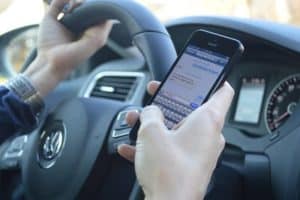Just 15 years ago, the state of Washington passed the first ban on texting while driving. Since then, 48 states plus Washington D.C. prohibit all drivers from texting and driving. Missouri only bans drivers under 21 from texting while driving. Montana has no limitations on who can drive and text.
These bans exist for good reasons. Texting while driving is one of the most dangerous driver behaviors. Drivers who text message while driving are six times more likely to crash than those who focus solely on driving.
Below you will learn the dangers of texting and driving and the legal consequences you may face when you drive and text. Having a car accident lawyer would be beneficial if you find yourself a victim of texting and driving. Reach out to us for your consultation.
How Distractions Affect Your Driving

Safety experts divide distractions into three categories:
Visual
Visual distractions take your eyes off the road. Reading a billboard or turning to look at your child in the back seat constitutes a visual distraction.
Manual
Manual distractions take your hands off the wheel. Drinking and changing the radio station are types of manual distractions.
Cognitive
Cognitive distractions take your mind off driving. Talking to a passenger or rehearsing a school presentation could distract you cognitively.
Can You Text and Drive?
Despite the image of the single, working parent who does everything, the human brain cannot multitask. Instead, the brain quickly shifts attention between multiple tasks. You may appear to multitask, but you complete the tasks in parallel.
When your brain works on tasks in parallel, it treats one task as primary and the others as secondary. The primary task may shift from task to task as your brain shifts its focus. But the secondary tasks remain in the background while you focus on the primary task. As a result, one task gets more attention while the other tasks fade into the background.
You cannot drive while texting because no one can simultaneously accomplish two physically and cognitively demanding tasks. While your brain focuses on driving, you will fumble with your phone. If your brain focuses on texting, your vision narrows, and your driving reflexes slow.
Texting requires your brain, eyes, and fingers to focus on reading incoming messages and composing and typing replies. As such, texting fulfills all three categories of distractions. Unfortunately, driving also requires your brain, eyes, and fingers, so one task will suffer while you focus on other tasks.
Looking to Hire a Lawyer?
When it comes to your chances of winning your claim it would be extremely beneficial to hire skilled and professional lawyers that have the experience to get you the results you want out of your case. Reach out to us and begin your consultation.
What Are the Effects of Texting on Your Driving?
Many of the actions you perform while driving become automatic. You move your foot from the gas to the brake and press gently when you see a red light. You look over your shoulder when you change lanes.
But traffic and road conditions require your attention to know when to take these automatic actions. If you do not see the light change from yellow to red, your brain does not move your foot. Similarly, if you see the light change, but your brain gets delayed in recognizing its significance, your foot movement gets delayed.
When studying multitasking, scientists found reaction-time switching costs. These delays happen when your brain switches between two tasks. You might have experienced this when you take an extra second to refocus on your work after a phone call interrupts you.
At work, these delays can be annoying. While driving, these delays can injure or kill someone. As your brain switches tasks, it is usually not fully engaged in either task. Instead, it winds up its thoughts on texting as it regains its focus on driving.
Tunnel Vision
While your brain focuses on texting, your eyes usually look at your phone instead of the road. You can miss something even if you rapidly shift your eyes from one task to another.
You can develop tunnel vision switching between the road and your phone’s screen. When this happens, your eyes only have time to scan directly before you and miss everything to each side.
More importantly, you will miss everything while you look at your screen. Drivers who get distracted for just two seconds double their chances of an accident.
Part of the reason comes from simple physics. At just 35 miles per hour, your car will travel over 100 feet during a two-second distraction. For the average car, that distance roughly equals seven car lengths.
Imagine driving seven car lengths on a busy road or highway with your eyes closed. That happens every time you read a short text.
Your Distracted Brain
The real problem comes as you process the message you received and compose a reply. Communication requires more brain power than people often appreciate.
Lawmakers had long assumed the problem with cell phone use while driving involved the physical activity of dialing and holding the phone to the ear. They passed laws requiring hands-free technology so drivers could still use their phones but in a safe way.
As it turned out, drivers using hands-free technology suffer the same degradation in driving skills as those using handheld phones. So the problem was not necessarily the manual distraction that led to cell phone accidents. The cognitive distraction of the conversation may have been just as problematic.
Driving Without Your Hands
This fact does not mean manual distraction plays no role in causing accidents. It plays a huge role. Drivers who text and drive have a 23 times higher risk of a serious accident.
Drivers who drive while making voice calls have a six times higher risk of a serious accident. Therefore, texting while driving is almost four times more dangerous than making a voice call.
This entire effect does not come from the manual task of typing. Texting also requires drivers to look at their devices while they read the message and proofread a reply. But this explains why technologies like voice recognition and text-to-speech may reduce, but not eliminate, the risks of texting while driving.
Consequences of Texting While Driving
Texting while you drive can bring many financial and legal consequences, including:
Car Accident
You are more likely to crash if texting while driving.
The distractions caused by texting will impede your ability to and give causes for collisions:
- See road and traffic conditions
- Recognize safety hazards
- Decide how to respond
- React to the hazard
These impairments predictably cause certain types of collisions, including:
- Failing to yield the right of way
- Following too closely
- Drifting out of a traffic lane
- Running a red light
Distracted drivers typically fail to see, recognize, and react to the traffic conditions. This behavior results in injuries and sometimes death to passengers and other road users.
Traffic Citation
Florida prohibits drivers from manually typing on an electronic device while sending or reading messages.
This awkward wording means you cannot use your device while driving to:
- Send or receive text messages
- Store or access data
- Connect to the internet
- Connect to messaging services like social media platforms
- Access or store data on your device while driving
The law allows primary enforcement, which means a Florida police officer can cite you for texting while driving even if you violated no other laws. In other words, the law prohibits texting while driving, even if the police officer does not see it affecting your driving.
This law has a few exceptions:
- You can text while stopped, even if the car is on and you are in the driver’s seat.
- Police officers, firefighters, and paramedics can text while driving if their duties require it.
- You can send a text reporting emergencies or crimes.
- You can receive and read messages from your vehicle, navigation system, or an emergency alert system.
If you violate the law, you can receive a traffic ticket. The first offense is a nonmoving violation. You can get fined up to $30 but will receive no points on your driving record.
The second or subsequent offense is a moving violation. You can get fined up to $60 and have three points added to your driving record.
For any offense, the judge can also charge you for court costs. These can run into hundreds of dollars.
The greatest impact from a traffic ticket is probably not the minimal fine. The state can suspend your driver’s license if you get convicted of a moving violation and have points added to your record. Points stay on your record for five years.
The state can suspend your license for:
- 12 points received over 12 months
- 18 points received over 18 months
- 24 points received over 36 months
If your license gets suspended, you must complete a driver’s education course and serve the suspension period before the state will return your license.
You must also report moving violations to your auto insurer. Florida uses a no-fault insurance system. Under this system, your insurer must pay 80 percent of your medical costs and 60 percent of your lost income whenever you get injured in an accident. You would receive these benefits even if you caused the crash.
Your insurer will use your ticket for texting and driving to increase your insurance premium. Texting and driving increase your risk of causing an accident. The insurer will want additional fees to cover its risk of paying benefits when a crash happens.
Civil Liability
When distracted drivers injure others, they may face civil liability for the resulting damages. Florida’s no-fault system makes drivers immune from lawsuits for minor accidents.
But when an accident victim suffers losses that exceed their policy limits or sustains significant and permanent injuries, they can pursue the at-fault driver.
Civil liability depends on proving negligence. If the injured person’s car accident lawyer can prove the other driver was texting, the injured person has a good chance of getting injury compensation.
Specifically, negligence requires proof of four elements:
- Duty
- Breach
- Causation
- Damages
All drivers have a legal duty to other road users to drive with reasonable care. Reasonable care means you must exercise the level of caution that an ordinary, prudent person would have exercised in the same situation.
You breach this legal duty when you do something unreasonably dangerous. Texting while driving is unreasonably dangerous. It increases the chances of causing a car accident for all of the reasons explained previously.
Importantly, the car accident attorney does not need to prove the driver intended to act negligently. Instead, negligence happens when you know or should have known that your actions were unreasonably dangerous. You will have a hard time arguing you did not know, and could not have known, the dangers of texting and driving.
Don’t Text and Drive signs are everywhere. Radio and television ads from Don’t Text and Drive facts and campaigns are unavoidable. All reasonable drivers know the dangers of texting and driving.
The accident victim’s car accident attorney will present evidence that your texting caused the car accident. Sometimes the nature of the accident helps the lawyer prove causation.
Suppose that you were texting and driving when you rear-ended another car. The car accident lawyer argues that you were probably distracted when you followed too closely or failed to brake early enough to avoid the crash.
The damages recoverable in a car accident lawsuit include economic and non-economic damages. If the accident victim who filed the lawsuit did not suffer a significant permanent injury, they could only seek economic damages like medical costs, lost income, and diminished earning capacity.
If the accident victim’s car accident lawyer filed the lawsuit after suffering a significant permanent injury, they could pursue economic and non-economic damages.
Non-economic damages cover how their injury diminished their quality of life. Non-economic damages include physical pain, mental suffering, and the inability to perform tasks like working or showering due to the injury.
Even if you carry liability insurance as Florida law requires, your policy might not cover all of the accident victim’s losses. If this happens, you become liable for the uncompensated losses. You could lose your assets because of a text message.
Victims of Texting and Driving

Even if you never text and drive, you can still fall victim to an irresponsible driver who texts while driving. Contact a personal injury lawyer to discuss your texting and driving accident and the injury compensation you can seek.
